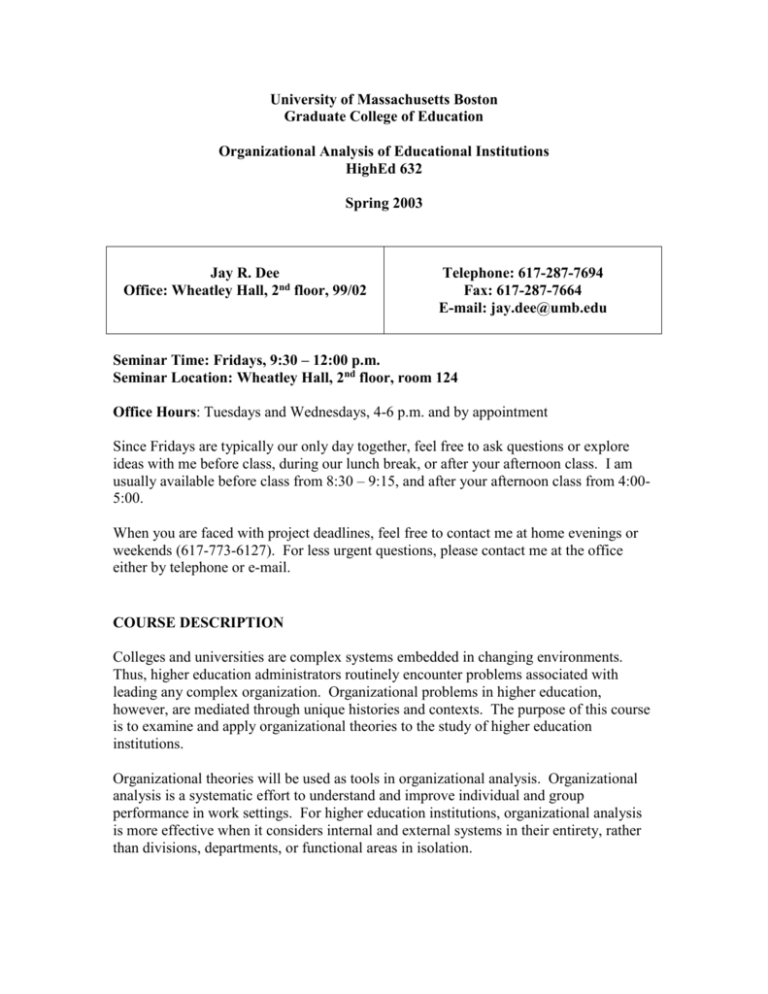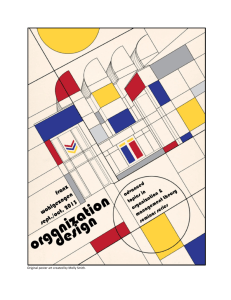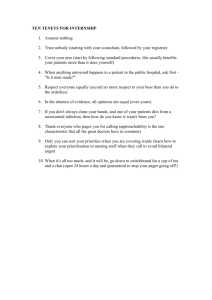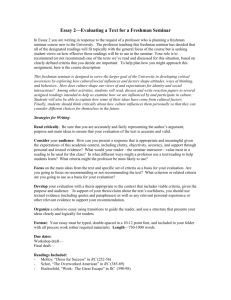Session One - University of Massachusetts Boston
advertisement

University of Massachusetts Boston Graduate College of Education Organizational Analysis of Educational Institutions HighEd 632 Spring 2003 Jay R. Dee Office: Wheatley Hall, 2nd floor, 99/02 Telephone: 617-287-7694 Fax: 617-287-7664 E-mail: jay.dee@umb.edu Seminar Time: Fridays, 9:30 – 12:00 p.m. Seminar Location: Wheatley Hall, 2nd floor, room 124 Office Hours: Tuesdays and Wednesdays, 4-6 p.m. and by appointment Since Fridays are typically our only day together, feel free to ask questions or explore ideas with me before class, during our lunch break, or after your afternoon class. I am usually available before class from 8:30 – 9:15, and after your afternoon class from 4:005:00. When you are faced with project deadlines, feel free to contact me at home evenings or weekends (617-773-6127). For less urgent questions, please contact me at the office either by telephone or e-mail. COURSE DESCRIPTION Colleges and universities are complex systems embedded in changing environments. Thus, higher education administrators routinely encounter problems associated with leading any complex organization. Organizational problems in higher education, however, are mediated through unique histories and contexts. The purpose of this course is to examine and apply organizational theories to the study of higher education institutions. Organizational theories will be used as tools in organizational analysis. Organizational analysis is a systematic effort to understand and improve individual and group performance in work settings. For higher education institutions, organizational analysis is more effective when it considers internal and external systems in their entirety, rather than divisions, departments, or functional areas in isolation. This course presents a 3x5 matrix for organizational analysis based on three orienting paradigms (positivism, social construction, and postmodernism) and five organizational system components (environment, structure, human relations, culture, and politics). Specific theories will be located within the 3x5 matrix. For example, expectancy theory is a positivist approach to understanding human relations. Loose coupling theory is a social construction approach to structure. Critical theory represents a postmodern view on organizational politics. Figure 1. Matrix for Organizational Analysis Positivism Environment Structure Human Relations Culture Politics Social Construction Postmodernism Loose Coupling Expectancy Theory Critical Theory We will fill out this matrix as we progress through the course. RELATIONSHIP OF COURSE TO GOALS OF PROGRAM The Higher Education Doctoral Program focuses on preparing leaders who are committed to fostering and facilitating organizational change. This course examines five major organizational components that when taken together provide a framework for understanding, initiating, and implementing change. Component 1 – Organizational environment. Higher education institutions operate within complex social, economic, and policy environments, and external factors may induce change or reinforce the status quo. Component 2 – Organizational structure. Organizational structures may serve as levers for or barriers against change. Component 3 – Organizational behavior. An understanding of motivation and behavior in organizations may be deemed essential for addressing resistance to change and for empowering others to engage in change. Component 4 – Organizational politics. Consideration of organizational politics can help one understand how individuals and groups develop and use power to enact or block change. Component 5 – Organizational culture. Knowledge of an organization’s culture can uncover norms, values, and beliefs that may support or impede change. 2 LEARNING OBJECTIVES Skills Seminar participants will enhance their skills in: 1. using theory to analyze organizational problems 2. using theory to understand and enact organizational leadership 3. thinking critically about concepts and theories 4. integrating and synthesizing research from the organizational literature Knowledge Seminar members will be able to: 1. define and describe relationships among the positivist, social construction, and postmodern perspectives on organizational theorizing 2. define and describe relationships among five organizational system components: environment, structure, human relations, culture, and politics 3. define and locate specific organizational theories within the 3x5 organizational analysis matrix 4. demonstrate connections among organizational theory, leadership, and change Understandings Seminar members will be able to: 1. use the 3x5 organizational analysis matrix to understand their own leadership practice 2. reflect on colleges and universities as systems 3. reflect on leadership as a process 4. reflect on the opportunities and challenges of organizational change PREREQUISITES Enrolled in the Higher Education Doctoral Program. TEXTBOOKS Bolman, L., & Deal, T. (1997). Reframing organizations: Artistry, choice, and leadership, 2nd ed. San Francisco: Jossey-Bass. ISBN 0-7879-0821-5 Hatch, M. (1997). Organization theory: Modern, symbolic, and postmodern perspectives. New York: Oxford University Press. ISBN 0-19-877490-7 ELECTRONIC COURSE-PACKET Hoy, W., & Miskel, C. (2001). Chapter four: Individuals in schools, pp. 125-173. In Educational administration: Theory, research, and practice, 6th ed. New York: McGraw Hill. 3 COURSE PROJECTS I. Organizational Consultancy Project (50% of grade) In this project, seminar participants will fulfill the roles of “organization” and “consultant.” This project targets skills of analysis and interpretation; specifically, applying theory to understand organizational problems and questions. Seminar members will develop a case description of their own institution (or another institution that they know well). The case should focus on dilemmas that the organization faces. Identify three to four key problems or questions that challenge the organization. Provide data/evidence/examples that explain each of the problems/questions that you identify. This document should be approximately four pages. Case descriptions are due Friday, February 7. The instructor will assess the case descriptions, making sure that the organizational context is described sufficiently and appropriately. On Friday, February 21, the approved case descriptions will be distributed to “consultants.” Each seminar member will serve as a consultant. Each seminar member will analyze another seminar member’s case description. They will address each of the problems/questions through the application of the 3x5 organizational analysis matrix. On Friday, April 25, the consultant will hold a meeting with the appropriate seminar member. Prior to this meeting, the consultant will share an initial draft of the analysis with the seminar member. The seminar member will provide feedback on the report. Copies of the feedback should be provided to both the consultant and the instructor. The consultant will also use the meeting as an opportunity to ask additional questions about the case, if more information would be useful to complete the analysis. The consultant will develop two products: (1) a written report for organizational leaders (approximately 15 pages); and (2) a 10-minute presentation to the “board of trustees” – an in-class presentation of the analysis. The consultant’s report and presentation should provide a theoretically-grounded analysis of each problem/question provided by the organization. The report and presentation should also explore the implications of the analysis. For example, the report/presentation may contain strategies to enhance organizational performance, a redefinition of the original problem presented to the consultant, and/or an identification of key questions that the organization should consider. Thus, the report/presentation will contain both analysis and interpretation. 4 Project Schedule February 7. Case descriptions submitted to instructor for approval. February 21. Case descriptions distributed to consultants. April 18. Consultants’ initial draft of the report is shared with appropriate seminar member. April 25. Meeting between consultant and appropriate seminar member. May 9. Consultants’ presentations to “board of trustees” May 12. (Monday). Consultants’ reports are due. Provide one copy for instructor and one copy for appropriate seminar member. Assessment You as Organization Case Description (5% of course grade) Feedback to Consultant (5% of course grade) You as Consultant Presentation to “Board” (10% of course grade) Written Report (30% of course grade) The “case description” and “feedback to consultant” will receive a non-graded assessment from the instructor. Case descriptions must identify key organizational problems/questions, and sufficiently explain the context surrounding each problem/question. Feedback should relate to the validity of the consultant’s analysis. Specifically, focus on content validity; did the consultant use theory in a way that illuminated all of the important dimensions of the problem/question? Also focus on internal validity; are the consultant’s conclusions justified (supported by sufficient evidence)? Finally, focus on pragmatic validity; is the consultant’s analysis consistent with your understanding of the organization? Grading and assessment criteria for the consultant presentation and report include: Application of concepts – concepts from readings and class discussions are utilized in the analysis, concepts are applied appropriately to the problem/question Strength of support for analysis – sufficient evidence is used to support analyses, and the evidence is related to the problem/question Appropriateness of interpretation – the interpretation is grounded in the analysis, the interpretation is logically linked to the analysis Logic and coherence – analysis would be understood by a general higher education audience, components are linked by effective transitions (i.e., text is not choppy), and mechanical errors are limited II. Brief Papers (30% of grade) This project focuses on critical thinking skills. Each week you will be asked to write a one-page paper related to the readings and class discussions. The papers will adhere to one of the following writing forms, which have been associated with developing critical thinking skills (Angelo & Cross, 1993): 5 directed paraphrase: summarize or restate important information or concepts for a specific purpose and audience one-word journal: generate one word to best summarize a particular reading, and justify the choice of that word mini-cases: illustrate the application of concepts to specific situations in your work setting Paper topics will be announced at the end of each class session, and completed papers will be collected at the beginning of the following class session. Typically, some class time will be devoted to free-writing/pre-writing for these papers. Thus, you will often have an opportunity to record your ideas while they are still “fresh.” Grading and assessment criteria include: Application of concepts – concepts from readings and class discussions are utilized in the responses, concepts are described sufficiently, and concepts are applied appropriately to the discussion Strength of support for responses – sufficient evidence is used to support responses, and evidence is related to the discussion Logic and coherence – responses would be understood by a general higher education audience, components are linked by effective transitions (i.e., text is not choppy), and mechanical errors are limited Angelo, T., & Cross, K. (1993). Classroom assessment techniques. San Francisco: Jossey-Bass. III. Literature Review (20% of grade) This project focuses on the skills of analysis and synthesis. Seminar participants will select a topic related to one of the five organizational system components (environment, structure, human relations, politics, culture). They will then identify three theoreticallybased studies related to the topic. The literature review paper will include the following elements: (a) a description of the organizational topic, (b) an explanation of the significance of this topic for organizational leadership, (c) an integrative analysis of the key concepts presented in the studies, and (d) a discussion of the implications of the studies (e.g., discrepancies among the studies, unresolved questions, recommendations for practice, recommendations for future research). Assessment and grades will be based on these four elements. The paper should be limited to 5 pages. 6 Project Schedule March 14. Topic approved by instructor. March 28. Articles approved by instructor. April 25. First draft of paper complete; seek peer feedback. May 9. Final draft provided to instructor. CLASS ACTIVITIES Session One January 31 Using Organizational Theory in Higher Education Thinking About Colleges and Universities as Complex Organizations Three Perspectives on Organizational Theorizing: Positivism, Social Construction, and Postmodern Readings: Bolman & Deal, chapters 1 and 2 Hatch, chapters 1 and 2 Session Two February 7 Organizational Environments Positivist Theories on Environment: Contingency Theory, Resource Dependence Theory, Population Ecology Theory Social Construction Theory: Institutional Theory Postmodern Views on Organization-Environment Relations Readings: Hatch, chapter 3 Session Three February 14 Organization-Environment Interactions Organizational Strategy Goals and Effectiveness Readings: Hatch, chapter 4 7 Session Four February 21 Organizational Structure Positivist Theorizing on Structure: Bureaucratic Theory Mechanistic and Organic Structures Differentiation and Integration: A Critical Duality Readings: Hatch, chapter 6 Session Five February 21 Social Construction Theorizing: Structuration Theory, Loose Coupling Theory Structure and Organizational Design: Functional, Divisional, Matrix, and Network Readings: Bolman & Deal, chapters 3, 4, and 5 Session 6 February 28 Organizational Behavior Human Relations in Organizations: Satisfaction, Commitment, Empowerment Positivist Theorizing: Motivation Theories (motivation-hygiene theory, equity theory, expectancy theory, job design theory) Readings: Electronic Course-packet: Hoy, W., & Miskel, C. (2001). Chapter Four: Individuals in schools, pp. 125-173. In Educational administration: Theory, research, and practice, 6th ed. New York: McGraw Hill. Session 7 March 7 Organizational Behavior Social Construction Theorizing: Image and Identity Postmodern Theorizing: Feminist Theory Readings: Bolman & Deal, chapters 6, 7, and 8 Session 8 March 14 Organizational Politics 8 Power in Organizations Conflict in Organizations Readings: Bolman & deal, chapters 9, 10, and 11 March 21 – Spring Break Session 9 March 28 Organizational Politics Power and Decision Making Positivist Theorizing: Bounded Rationality Social Construction Theorizing: “Garbage Can” Model Postmodern Theorizing: Critical Theory Readings: Hatch, chapters 9 and 10 April 4 – Service Learning Conference Session 10 April 11 Organizational Culture Culture and Socialization Culture and Leadership Readings: Bolman & Deal, chapters 12, 13, and 14 Session 11 April 18 Organizational Culture Positivist Theorizing on Culture: Culture as Integration Social Construction Theorizing: Culture as Differentiation Postmodern Theorizing: Culture as Fragmentation Ideology and Organizational Culture Readings: Hatch, chapters 7 and 11 9 Session 12 April 25 Applying Organizational Theory in Organizational Analysis Using the 3x5 Matrix “Consultant” Sessions on Organizational Cases Readings: Bolman & Deal, chapters 15, 16, and 20 and 21 Session 13 May 2 Organizational Theory and Leadership Organizational Theory and Ethics Readings: Bolman & Deal, chapters 17, 18, and 19 Session 14 May 9 Organizational Change Organizational Learning “Consultant” Presentations Readings: Hatch, chapter 12 If you have a disability and feel you will need accommodation in order to complete course requirements, please contact the Ross Center for Disability Services (McCormack Hall, 1st floor, room 401) at 617-287-7430. This syllabus is subject to change. 10





